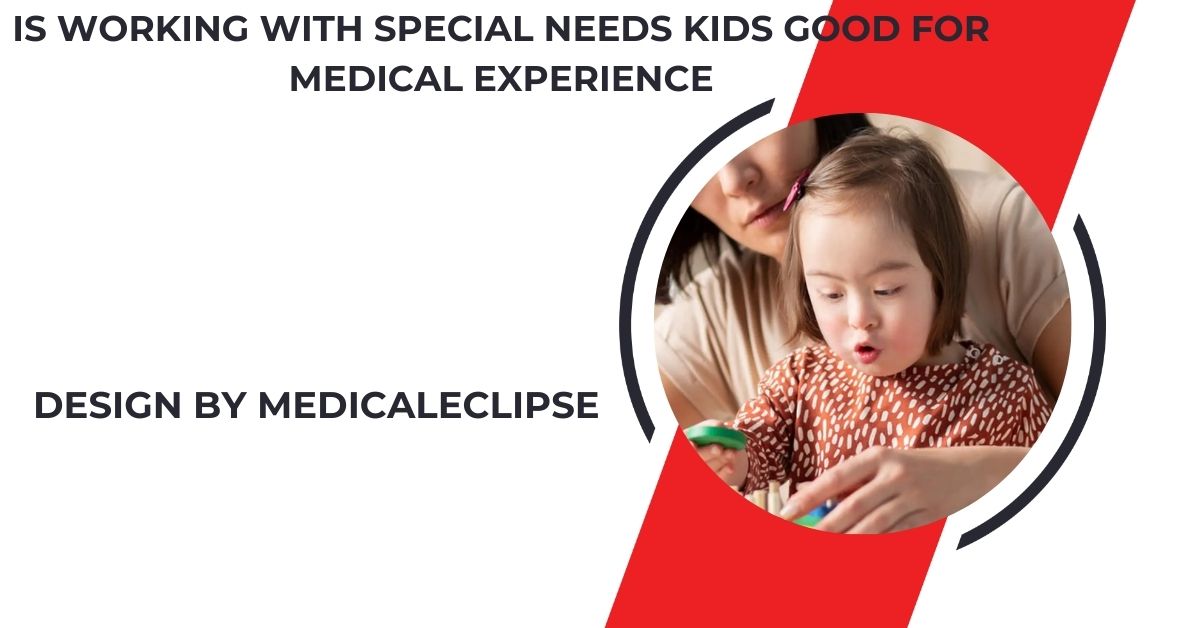Working with special needs kids provides valuable medical experience, enhancing skills like communication, empathy, and problem-solving, while exposing you to various medical conditions.
This article explores why working with special needs children can be an excellent way to gain medical experience and the skills you’ll develop that will benefit you in your medical career.
Developing Core Medical Skills:

When you work with special needs children, you’re often exposed to a variety of medical conditions, such as autism spectrum disorders, cerebral palsy, Down syndrome, and various developmental delays. These experiences can enhance your knowledge of medical conditions and how they manifest differently in children.
Understanding how to manage these conditions, track their development, and recognize signs of medical issues gives you firsthand experience in a clinical setting. You’ll also learn to work alongside healthcare professionals like pediatricians, occupational therapists, speech therapists, and physical therapists. This interdisciplinary experience is essential for anyone pursuing a career in healthcare.
Improving Communication and Patience:
One of the key skills you’ll develop by working with special needs children is the ability to communicate effectively. Many of these children may have difficulty with verbal communication, and learning how to engage with them using alternative communication methods is crucial. Whether you’re using visual aids, sign language, or assistive technology, you’re honing your communication skills in a unique way.
Moreover, patience is critical when working with children who may not respond to traditional teaching or medical methods. You’ll find yourself learning how to break down complex instructions or medical explanations into simpler, more digestible steps, which is an essential skill for any healthcare professional.
Learning Empathy and Compassion:
Healthcare isn’t just about technical knowledge—it’s about caring for patients as individuals. Working with special needs children often requires high levels of empathy, as these children and their families face a variety of emotional, social, and physical challenges. Through your work, you’ll build emotional intelligence and learn to approach each patient with compassion, which will be invaluable in your future medical career.
This experience can also help you better understand the social and psychological aspects of medical care. By working closely with families, you gain insight into their emotional struggles, helping you become more attuned to the needs and concerns of caregivers and relatives.
Also Read: Can A Chiropractor Prescribe Medication – Why Chiropractors Don’t Prescribe Drugs!
Gaining Experience in Behavioral Management:
Children with special needs may exhibit challenging behaviors, often as a result of frustration, sensory overload, or difficulty in expressing themselves. Learning how to manage these behaviors safely and effectively will prepare you for the unpredictable nature of medical care.
In a medical setting, being able to stay calm under pressure and knowing how to handle difficult or unexpected situations is crucial. The techniques you learn in behavioral management, such as de-escalation strategies or positive reinforcement, will translate well into managing stressed or uncooperative patients in your future practice.
Exposure to Multidisciplinary Teams:
One of the key benefits of working with special needs children is the opportunity to collaborate with a wide range of professionals. Medical professionals, therapists, educators, and social workers all work together to provide holistic care for special needs children.
This exposure to interdisciplinary collaboration mirrors the team-based approach common in healthcare settings. Understanding how to communicate and collaborate with professionals from different disciplines will be a huge advantage when you enter the medical field. It fosters respect for each role and helps you appreciate the value of teamwork in providing comprehensive patient care.
Enhancing Problem-Solving Skills:

Every child with special needs is unique, and what works for one child may not work for another. This requires you to think critically and develop tailored approaches for each child, enhancing your problem-solving skills. Whether you are adapting teaching methods, creating personalized care plans, or finding ways to help the child become more independent, you are honing your ability to think creatively in medical care.
In a medical career, problem-solving is crucial—no two patients are alike, and often, doctors need to think on their feet to adjust treatment plans. Working with special needs kids sharpens this skill, preparing you for the challenges of diagnosing and treating patients.
Building Resilience:
Healthcare professionals often face emotionally draining situations, and working with special needs children can also be challenging. However, these challenges build emotional resilience. Learning how to deal with setbacks, celebrate small victories, and persist in the face of adversity are all important lessons that will serve you well in any medical profession.
By developing emotional resilience, you are better prepared to handle the inevitable stresses that come with medical careers, from long hours to difficult diagnoses.
Gaining Practical Experience for Pediatric Care:
For those interested in pediatrics, working with special needs children offers specific and relevant experience. You’ll learn how to engage with children who may have trouble communicating their needs, interpret non-verbal cues, and be more attuned to the nuances of child behavior. Additionally, you’ll become familiar with how various conditions impact child development and what medical interventions or therapies are available to assist them.
This specialized knowledge will set you apart when applying for medical school or pediatric residency programs, demonstrating your experience and passion for helping vulnerable populations.
FAQ’s
1.What medical conditions are you exposed to when working with special needs kids?
You may encounter conditions like autism, cerebral palsy, Down syndrome, and developmental delays, which enhance your understanding of how these conditions manifest in children.
2.How does this experience improve communication skills?
It teaches you to use alternative methods like visual aids, sign language, or assistive technology, helping you communicate with children who may have difficulty expressing themselves.
3.Why is empathy important in working with special needs children?
Empathy allows you to understand the emotional, social, and physical challenges these children and their families face, enhancing your ability to provide compassionate care.
4.How does working with special needs children improve problem-solving skills?
Each child is unique, requiring you to think critically and tailor approaches, which sharpens your ability to adapt to individual patient needs in medical care.
5.How does this experience help in pediatric care?
It provides practical experience in understanding child development, non-verbal communication, and managing specific medical interventions for pediatric patients.
Conclusion
Working with special needs children provides invaluable medical experience by developing essential skills like communication, empathy, and problem-solving. It offers hands-on exposure to various conditions and therapies, making you a more compassionate healthcare provider. This experience is ideal for those pursuing medicine, as it prepares you for real-world healthcare challenges.
Related Post
- Why Is Signify Health Calling Me – Understanding the Purpose Behind the Call!
- Adolescent Health Sandra Mcchanja – Advocacy, Research, and Impact!
- Dentists Who Take Total Health – Find the Right Provider for You!
- Stonehenge Health Dynamic Brain – A Complete Review of Ingredients, Benefits & Results!
- Is The $6400 Health Subsidy Real – Separating Fact from Fiction!

Leave a Reply